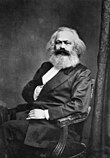
Back قانون القيمة Arabic Llei del valor Catalan Wertgesetz German Ley del valor Spanish Théorie de la valeur (marxisme) French Hukum nilai ID Teoria marxiana del valore Italian ਮੁੱਲ ਦਾ ਕਾਨੂੰਨ Punjabi Lei do valor Portuguese Закон стоимости Russian
| Part of a series on |
| Marxian economics |
|---|
 |
| Part of a series on |
| Marxism |
|---|
The law of the value of commodities (German: Wertgesetz der Waren),[1] known simply as the law of value, is a central concept in Karl Marx's critique of political economy first expounded in his polemic The Poverty of Philosophy (1847) against Pierre-Joseph Proudhon with reference to David Ricardo's economics.[2][note 1] Most generally, it refers to a regulative principle of the economic exchange of the products of human work, namely that the relative exchange-values of those products in trade, usually expressed by money-prices, are proportional to the average amounts of human labor-time which are currently socially necessary to produce them within the capitalist mode of production.[3][note 2]
Thus, the fluctuating exchange value of commodities (exchangeable products) is regulated by their value, where the magnitude of their value is determined by the average quantity of human labour which is currently socially necessary to produce them (see labor theory of value and value-form). Theorizing this concept and its implications preoccupied Marx for more than two decades.[citation needed]
When Marx talked about "value relationships" or "value proportions" (German: Wertverhältnisse), he did not mean "the money" or "the price". Instead, he meant the ratio of value (or 'worth') that exist between products of human labour. These relationships can be expressed by the relative replacement costs of products as labour hours worked. The more labour it costs to make a product, the more it is worth and inversely the less labour it costs to make a product, the less it is worth. Money-prices are at best only an expression or reflection of Marx's value relationships—accurately or very inaccurately. Products can be traded above or below their value in market trade and some prices have nothing to do with product-values at all (in Marx's sense) because they refer to tradeable objects which are not regularly produced and reproduced by human labour, or because they refer only to claims on financial assets.
- ^ Karl, Marx (1962) [1867], "Zwölftes Kapitel: Teilung der Arbeit und Manufaktur, 4. Teilung der Arbeit innerhalb der Manufaktur und Teilung der Arbeit innerhalb der Gesellschaft", Das Kapital. Erster Band. Buch I: Der Produktionsprozeß des Kapitals [Capital. Volume I: The Process of Production of Capital] (in German), Berlin: Dietz Verlag,
...indem andrerseits das Wertgesetz der Waren bestimmt, wieviel die Gesellschaft von ihrer ganzen disponiblen Arbeitszeit auf die Produktion jeder besondren Warenart verausgaben kann.
- ^ Takahisi Oishi, The unknown Marx: reconstructing a unified perspective. Foreword by Terrell Carver. London: Pluto Press, 2001
- ^ John Eaton, Political Economy: A Marxist Textbook. Rev ed. 1963 reprinted 1970. p. 29.
Cite error: There are <ref group=note> tags on this page, but the references will not show without a {{reflist|group=note}} template (see the help page).